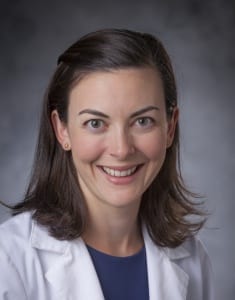Voices: The Myth of Effortless Perfection | Brittany Davidson, MD
The Myth of ‘Effortless Perfection’ | Brittany Davidson, MD
I had a healthy fear of GYN/ONC fellowship when I started. My OB/GYN residency wasn’t one I would particularly designate as “onc-heavy” and, while I loved taking care of the oncology patients, I worried whether I would be happy or capable of doing so on a full-time basis. I worried about whether my surgical skills would be up to snuff, whether my attendings would regret ranking me, whether I was emotionally capable to provide these women with the care they needed during one of the most vulnerable times in their lives. What can I say; I worried.

Brittany Davidson, MD
I looked at my mentors and saw them performing a complex dance, navigating the physical and psychological demands of being a gynecologic oncologist, being a present parent and somehow managing to have a successful research career with numerous publications, accolades and grant funding. I, on the other hand, had never operated on the robot, had yet to have a paper published and was trying to figure out how to have a successful two-physician marriage. Everyone around me looked so graceful, “effortlessly perfect,” while I struggled with what felt like two left feet.
During a fellows’ lecture one week, we watched a short YouTube video from the Cleveland Clinic’s Empathy Series, entitled “The Human Connection to Patient Care.” If you have never seen it, please—I urge you—watch it today. This four-minute video resonated with me that day and still does to this day. Meant to encourage care providers to “put themselves in their patients’ shoes,” I felt like I could (and do) apply this to all aspects of my life. When I see a patient, I remind myself that our 20-minute appointment together, while just a fraction of my day, may be the biggest, most important 20 minutes of her week, month or life, even if she doesn’t let on. I need to stay in the present, focus on what is in front of me and, most importantly, be kind—both to those I interact with throughout the day and myself.
Often times we “put on a good face”—for our patients, our family, our colleagues. Though many times the separation of work and life is important to maintain a healthy work-life balance, it’s not as black and white as we’d like. Difficult events are just that—difficult. Life bleeds over into work and vice versa. We like absolutes and concretes in medicine, but we all know, it’s rarely that simple. Try as we might, we’ve all had that unexpected patient outcome or an argument with a loved one. We are all human, we all have struggles, we all make mistakes; many times we opt not to outwardly share these trials and tribulations for fear of judgment or perceived inadequacy. For not being “effortlessly perfect.”
I miscarried towards the end of my fellowship last year and, again, felt the pangs of being imperfect. Most of my colleagues knew I was pregnant since I had struggled with significant nausea and vomiting (not so fun in the OR) from the start. It was one of those times where I thought to myself, “Work stays at work and life stays at home.” But again, it wasn’t that simple. In fact, the immense outpouring of love and support at work that I received during that difficult time helped me to climb out of my “imperfect” funk. The ability to talk about and share this particular struggle with others, many of whom had been through similar situations, was comforting beyond words. It’s taken me 33 years to start to realize that it’s okay to not be “effortlessly perfect” in whatever endeavors I may find myself. The ability to treat everyone, those with internal and external struggles, with kindness, is perhaps the most important. Practicing self-kindness and acceptance is not something I master on a daily basis, but certainly a task worth striving for. Many times I feel that my patients are better at this—acceptance of situations they cannot control, self-kindness as their body changes and strength to persevere through life’s storms. Being “effortlessly perfect” is impossible when you are battling cancer and isn’t even important. Kindness. Kindness to yourself, and others, is really what matters in the end.
Brittany Davidson, MD, is an Assistant Professor of Obstetrics and Gynecology at Duke University School of Medicine in Durham, NC.